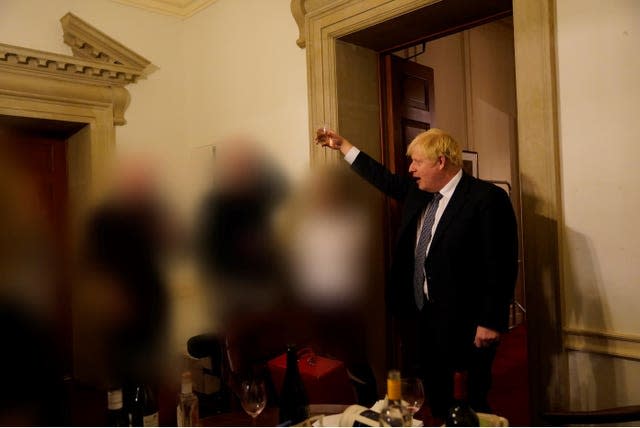Ethics adviser raises questions over Boris Johnson’s Ministerial Code compliance
Boris Johnson’s ethics adviser has suggested the Prime Minister’s partygate fine may have breached the Ministerial Code.
Lord Geidt, the independent adviser on the Ministerial Code, said a “legitimate question” had arisen as to whether the case of the fixed penalty notice (FPN) might have constituted a breach of the “overarching duty within the Ministerial Code of complying with the law”.
The Prime Minister was issued with an FPN over a birthday party thrown in his honour in the Cabinet Room in June 2020 at a time when indoor socialising was banned.

Lord Geidt also questioned the Prime Minister’s willingness to “take responsibility for his own conduct” in relation to the ministerial rules and delivered a withering assessment of exchanges with Downing Street officials.
This included Lord Geidt advising them that Mr Johnson should be “ready to offer public comment” on his obligations under the code, noting this had “not been heeded”.
Mr Johnson responded in writing to Lord Geidt by claiming the FPN “did not breach” the Ministerial Code as there was “no intent to break the law”.
He said his reasoning for this view included that there have been “past precedents of ministers who have unwittingly breached regulations where there was no intent to break the law”.

Labour deputy leader Angela Rayner said of the exchanges: “The Prime Minister’s second ethics adviser has now threatened to quit, in the latest sign of the rampant sleaze engulfing Downing Street.”
Lord Geidt, in his preface to his latest annual report, warned it may be “especially difficult to inspire that trust” in the rules for ministers “if any Prime Minister, whose code it is, declines to refer to it”.
He added: “In the case of the fixed penalty notice recently issued to and paid by the Prime Minister, a legitimate question has arisen as to whether those facts alone might have constituted a breach of the overarching duty within the Ministerial Code of complying with the law.
“It may be that the Prime Minister considers that no such breach of his Ministerial Code has occurred.
“In that case, I believe a Prime Minister should respond accordingly, setting out his case in public. This matters to the integrity of the independent adviser who, otherwise, might until recently have had to seek a Prime Minister’s consent to make inquiries into a Prime Minister’s conduct.
“In the present circumstances, I have attempted to avoid the independent adviser offering advice to a Prime Minister about a Prime Minister’s obligations under his own Ministerial Code.
“If a Prime Minister’s judgment is that there is nothing to investigate or no case to answer, he would be bound to reject any such advice, thus forcing the resignation of the independent adviser.
“Such a circular process could only risk placing the Ministerial Code in a place of ridicule.”
Lord Geidt went on to say he had repeatedly advised Mr Johnson’s officials that Mr Johnson should be “ready to offer public comment” on his obligations under the code even if he judged himself not to be in breach.
He said: “Its purpose has simply been to ensure that the Prime Minister should publicly be seen to take responsibility for his own conduct under his own Ministerial Code.
“That advice has not been heeded and, in relation to the allegations about unlawful gatherings in Downing Street, the Prime Minister has made not a single public reference to the Ministerial Code.”
Mr Johnson, in a letter of reply released on Tuesday evening, said he had taken “full responsibility for everything that took place on my watch” in light of lockdown-busting gatherings in Downing Street and pointed to his House of Commons apology.
He reiterated there was “no intent to break the regulations”, adding: “I did not consider that the circumstances in which I received a fixed penalty notice were contrary to the regulations.
“I have accepted the outcome and paid it in compliance with legal requirements. Paying a fixed penalty notice is not a criminal conviction.”
He added: “In relation to the fixed penalty notice for my attendance in the Cabinet Room on June 19 2020, I believe that, taking account of all the circumstances, I did not breach the code.
“In coming to that conclusion, (a) I have duly considered past precedents of ministers who have unwittingly breached regulations where there was no intent to break the law; (b) I have been fully accountable to Parliament and the British people and rightly apologised for the mistake; (c) I have corrected the parliamentary record in relation to past statements; and (d) I have followed the principles of leadership and accountability in doing so.
“In my view, the same principles apply to the fixed penalty notice paid by the Chancellor of the Exchequer.”
Mr Johnson was last week accused of watering down the code after the Government said it was being updated – making clear that ministers will not necessarily have to resign for more minor violations.
Instead the Prime Minister will have the option of imposing a lesser sanction such as “some form of public apology, remedial action or removal of ministerial salary for a period”.

 Yahoo News
Yahoo News 
